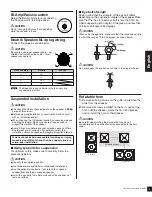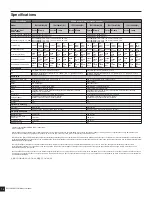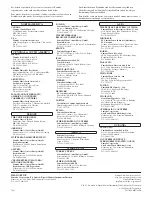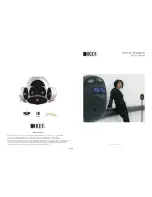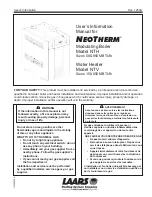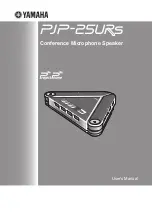
(6)-1
English
IF2115M/IF2112M Owner’s Manual
2
PRECAUTIONS
PLEASE READ CAREFULLY BEFORE PROCEEDING
* Please keep this manual in a safe place for future reference.
CAUTION
Always follow the basic precautions listed below to avoid the possibility of physical injury to you or
others, or damage to the device or other property. These precautions include, but are not limited to, the
following:
• Always consult qualified Yamaha service personnel if the
device installation requires construction work, and make
sure to observe the following precautions.
- Choose mounting hardware and an installation location that
can support the weight of the device.
- Avoid locations that are exposed to constant vibration.
- Make sure to use the specified hardware.
- Inspect the device periodically.
• When transporting or moving the device, always use two or
more people. Attempting to lift the device by yourself may
damage your back, result in other injury, or cause damage to
the device itself.
• Before moving the device, remove all connected cables.
• Do not expose the device to excessive dust or vibrations, or
extreme cold or heat (such as in direct sunlight, near a
heater, or in a car during the day) to prevent the possibility of
panel disfiguration or damage to the internal components.
• Do not place the device in an unstable position where it
might accidentally fall over.
• Before connecting the device to other devices, turn off the
power for all devices. Before turning the power on or off for
all devices, set all volume levels to minimum.
• Use only speaker cables for connecting speakers to the
speaker jacks. Use of other types of cables may result in fire.
• Be sure to observe the amplifier’s rated load impedance (see
page 14), particularly when connecting speakers in parallel.
Connecting an impedance load outside the amplifier's rated
range can damage the amplifier.
• When choosing a power amplifier to use with your speakers,
make sure that its power output matches the speakers’
power capacity (refer to the Specifications on page 14).
Even if the amplifier’s power output is lower than the
speakers’ power capacity, the speakers may be damaged
when clipping of a high input signal occurs. The following
may cause damage to speakers:
- Feedback caused when using a microphone.
- Continuous high sound pressure level produced by electronic
instruments.
- Continuous high-power output of distorted signals.
- Popping noises caused by turning on equipment, or by
connecting or disconnecting system components while the
amplifier is turned on.
• When turning on the AC power in your audio system, always
turn on the power amplifier LAST, to avoid speaker damage.
When turning the power off, the power amplifier should be
turned off FIRST for the same reason.
• Do not operate this device at high volume levels or at a level
that is uncomfortable, since it is capable of producing sound
levels that could cause permanent hearing loss. If you
experience any discomfort or ringing in the ears, or suspect
an hearing loss, you should consult an audiologist.
* Illustrations herein are for explanatory purposes only, and
may not match actual appearance during operation.
* Company names and product names herein are trademarks
or registered trademarks of their respective companies.
For details on signal processor settings when driving speakers
with the use of multiple power amplifiers, please refer to the
web site below.
Yamaha Pro Audio global web site
http://www.yamahaproaudio.com/
Location
Connections
Yamaha cannot be held responsible for damage caused
by improper use or modifications to the device.
Handling caution



